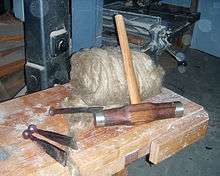Oakum



Oakum is a preparation of tarred fibre used in shipbuilding for caulking or packing the joints of timbers in wooden vessels and the deck planking of iron and steel ships, as well as cast iron pipe plumbing applications. Oakum was at one time recycled from old tarry ropes and cordage, which were painstakingly unravelled and taken apart into fibre. This task of picking and preparation was a common penal occupation in prisons and workhouses.
In modern times, the fibrous material used in oakum comes from virgin hemp or jute. The fibers are impregnated with tar or a tar-like substance, traditionally pine tar (also called 'Stockholm tar'), an amber-coloured pitch made from pine sap. Tar-like petroleum by-products can also be used for modern oakum. White oakum is made from untarred material.
History
The word oakum derives from Middle English okome, from Old English ācumba, from ā- (separative and perfective prefix) + -cumba (akin to Old English camb comb)—literally "off-combings".
Picking oakum was a common occupation in Victorian times in British prisons and workhouses. In 1862, girls under 16 at Tothill Fields Bridewell had to pick 1 pound (0.45 kg) a day, and boys under 16 had to pick 1 1⁄2 pounds (0.68 kg).[1] Over the age of 16, girls and boys had to pick 1 1⁄2 and 2 pounds (0.68 and 0.91 kg) per day respectively.[1] The oakum was sold for £4 10s (£395 in modern money) per hundredweight (100 to 112 pounds (45 to 51 kg)).[1] At Coldbath Fields Prison, the men's counterpart to Tothill Fields, prisoners had to pick 2 pounds (0.91 kg) per day unless sentenced to hard labour, in which case they had to pick between 3 and 6 pounds (1.4 and 2.7 kg) of oakum per day.[2]
In Herman Melville's novella Benito Cereno, crew members of a slave ship spend their idle hours picking oakum.
Charles Dickens's novel Oliver Twist mentions the extraction of oakum by orphaned children in the workhouse. The oakum extracted was for use on navy ships, and the instructor said that they were serving the country.
The Innocents Abroad, a novel by Mark Twain, also mentions in chapter 37 a "Baker's Boy/Famine Breeder" who eats soap and oakum, but prefers oakum, which makes his breath foul and teeth stuck up with tar.
Plumbing
Oakum can be used to seal cast iron pipe drains. After setting the pipes together, workers pack oakum into the joints, then pour molten lead into the joint to create a permanent seal. The oakum swells and seals the joint, the "tar" in the oakum prevents rot, and the lead keeps the joint physically tight. Today, modern methods, such as rubber seals, are more common.[3]
References
- 1 2 3 Mayhew, Henry; Binny, John (1862). The Criminal Prisons of London, and Scenes of Prison Life. Volume 3 of The Great Metropolis. London: Griffin, Bohn, and Company. p. 477.
- ↑ Mayhew & Binny (1862) p. 312.
- ↑ Yates, David (1 February 2005). "The Lost Art of Making Lead Joints". Contractormag.com. Retrieved 6 July 2011.
 This article incorporates text from a publication now in the public domain: Chisholm, Hugh, ed. (1911). Encyclopædia Britannica (11th ed.). Cambridge University Press.
This article incorporates text from a publication now in the public domain: Chisholm, Hugh, ed. (1911). Encyclopædia Britannica (11th ed.). Cambridge University Press.